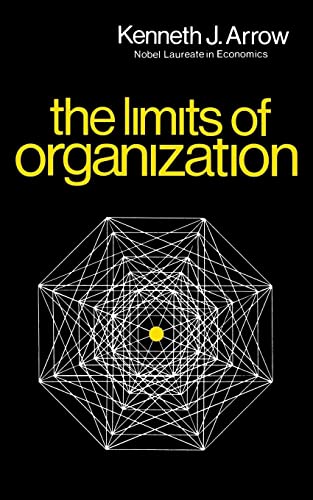Articoli correlati a The Limits of Organization

Sinossi
The tension between what we wish for and what we can get, between values and opportunities, exists even at the purely individual level. A hermit on a mountain may value warm clothing and yet be hard-pressed to make it from the leaves, bark, or skins he can find. But when many people are competing with each other for satisfaction of their wants, learning how to exploit what is available becomes more difficult. In this volume, Nobel Laureate Kenneth J. Arrow analyzes why - and how - human beings organize their common lives to overcome the basic economic problem: the allocation of scarce resources. The price system is one means of organizing society to mediate competition, and Arrow analyzes its successes and failures. Alternative modes of achieving efficient allocation of resources are explored: government, the internal organization of the firm, and the 'invisible institutions' of ethical and moral principles. Professor Arrow shows how these systems create channels to make decisions, and discusses the costs of information acquisition and retrieval. He investigates the factors determining which potential decision variables are recognized as such. Finally, he argues that organizations must achieve some balance between the power of the decision makers and their obligation to those who carry out their decisions - between authority and responsibility.
Le informazioni nella sezione "Riassunto" possono far riferimento a edizioni diverse di questo titolo.
Product Description
Book by Arrow Kenneth J
Le informazioni nella sezione "Su questo libro" possono far riferimento a edizioni diverse di questo titolo.
Compra usato
Condizioni: molto buonoEUR 3,23 per la spedizione in U.S.A.
Destinazione, tempi e costiCompra nuovo
Visualizza questo articoloEUR 2,27 per la spedizione in U.S.A.
Destinazione, tempi e costiRisultati della ricerca per The Limits of Organization
The Limits of Organization (Fels Lectures on Public Policy Analysis)
Da: HPB Inc., Dallas, TX, U.S.A.
Paperback. Condizione: Very Good. Connecting readers with great books since 1972! Used books may not include companion materials, and may have some shelf wear or limited writing. We ship orders daily and Customer Service is our top priority! Codice articolo S_404680468
Quantità: 1 disponibili
Limits of Organization
Da: ThriftBooks-Reno, Reno, NV, U.S.A.
Paperback. Condizione: Good. No Jacket. Pages can have notes/highlighting. Spine may show signs of wear. ~ ThriftBooks: Read More, Spend Less 0.28. Codice articolo G0393093239I3N00
Quantità: 1 disponibili
Limits of Organization
Da: ThriftBooks-Dallas, Dallas, TX, U.S.A.
Paperback. Condizione: Good. No Jacket. Pages can have notes/highlighting. Spine may show signs of wear. ~ ThriftBooks: Read More, Spend Less 0.28. Codice articolo G0393093239I3N00
Quantità: 1 disponibili
Limits of Organization
Da: ThriftBooks-Atlanta, AUSTELL, GA, U.S.A.
Paperback. Condizione: Good. No Jacket. Pages can have notes/highlighting. Spine may show signs of wear. ~ ThriftBooks: Read More, Spend Less 0.28. Codice articolo G0393093239I3N00
Quantità: 1 disponibili
Limits of Organization
Da: ThriftBooks-Atlanta, AUSTELL, GA, U.S.A.
Paperback. Condizione: Very Good. No Jacket. May have limited writing in cover pages. Pages are unmarked. ~ ThriftBooks: Read More, Spend Less 0.28. Codice articolo G0393093239I4N00
Quantità: 1 disponibili
The Limits of Organization (Fels Lectures on Public Policy Analysis)
Da: HPB-Red, Dallas, TX, U.S.A.
Paperback. Condizione: Good. Connecting readers with great books since 1972! Used textbooks may not include companion materials such as access codes, etc. May have some wear or writing/highlighting. We ship orders daily and Customer Service is our top priority! Codice articolo S_374688348
Quantità: 1 disponibili
The Limits of Organization (Fels Lectures on Public Policy Analysis)
Da: HPB-Ruby, Dallas, TX, U.S.A.
Paperback. Condizione: Very Good. Connecting readers with great books since 1972! Used books may not include companion materials, and may have some shelf wear or limited writing. We ship orders daily and Customer Service is our top priority! Codice articolo S_436783657
Quantità: 1 disponibili
The Limits of Organization
Da: Better World Books, Mishawaka, IN, U.S.A.
Condizione: Good. Used book that is in clean, average condition without any missing pages. Codice articolo 4268985-75
Quantità: 1 disponibili
Limits of Organization; Fels Lectures on Public Policy Analysis;
Da: books4less (Versandantiquariat Petra Gros GmbH & Co. KG), Welling, Germania
Broschiert. Condizione: Gut. 86 Seiten; Das hier angebotene Buch stammt aus einer teilaufgelösten Bibliothek und kann entsprechende Kennzeichnungen aufweisen (Rückenschild, Instituts-Stempel.). Aufgrund des Alters und der häufigen Nutzung können Stabilität, Einband sowie Papierqualität beeinträchtigt sein. In ENGLISCHER Sprache. Sprache: Englisch Gewicht in Gramm: 125. Codice articolo 2177244
Quantità: 1 disponibili
THE LIMITS OF ORGANIZATION. lst ed.
Da: de Wit Books, HUTCHINSON, KS, U.S.A.
VG, unmarked 5" x 8" Paperback. 86 pp. Codice articolo 032129
Quantità: 1 disponibili

